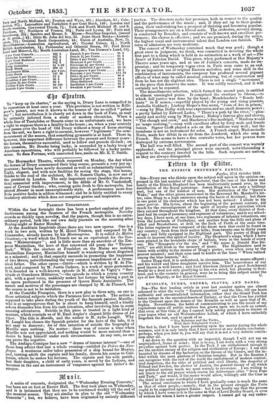3littoir.
A series of concerts, designated the "Wednesday Evening Concerts," has been set on foot at Exeter Hall. The first took place on Wednesday, and it is intimated that they are to be continued weekly till the end of the musical season. They are similar in plan to the old "Wednesday Concerts"; but, we believe, have been originated by entirely different parties. The directors make fair promises, both in respect to the quality and the performance of the music ; and, if they act up to their profes- sions', their undertaking has a prospect of thriving and becoming popular. Their arrangements are on a liberal scale. The orchestra, seventy strong, is conducted by Benedict, and consists of well-known and excellent per- formers ; the chorus is effective; and we are promised, during the series, the highest vocal and instrumental talent that London can furnish. The rates of admission are very moderate. The concert of Wednesday contained much that was good; though a great error in judgment, we think, was committed in devoting the whole first part to a thing which is held in no estimation as a work of art—The Desert of Felicien David. This piece, when performed at Her Majesty's Theatre some years ago, and at one of Jullien's concerts, made no im- pression ; and its temporary vogue even in Paris soon came to an end. By an ingenious use of original Eastern melodies, and some skill in the combination of instruments, the composer has produced several piquant effects of what may be called musical colouring, but of construction and form he has not the slightest idea. There is not a single " movement " in the piece that deserves the name. It was coldly received, and it will certainly not be repeated.
The miscellaneous selection, which formed the second part, is entitled to almost unmingled praise. It comprised the overture to Oberon,—to which full justice was done by the band ; Mendelssohn's "Rondo bril- lante" in B minor,—superbly played by the young and rising pianiste, Arabella Goddard ; Lindsay Sloper's fine scene, "Joan of Are in prison," —sung by Miss Dolby with true expression and no small dramatic power ; a pretty ballad by Edward Loder, "There's a path by the river,"—plea- santly and archly sung by Miss lasses; Bishop's famous glee and chorus, "The chough and crow," and Macfarren's fine madrigal, "Maidens would ye 'scape undoing,"—sung with excellent effect by forty male and female voices. Signor Cioffi played a solo on the trombone very well ; but the trombone is not an instrument for solos. A French singer, Mademoiselle None, made her debut in an air from the _Lombardi, which she sang in French. She seems to have a fine contralto voice, but her powers were destroyed by extreme nervousness.
The hall was well filled. The second part of the concert was warmly applauded; and the principal pieces were encored, notwithstanding a request to the contrary inserted in the bills. Such requests are useless, as they are always disregarded.


























 Previous page
Previous page